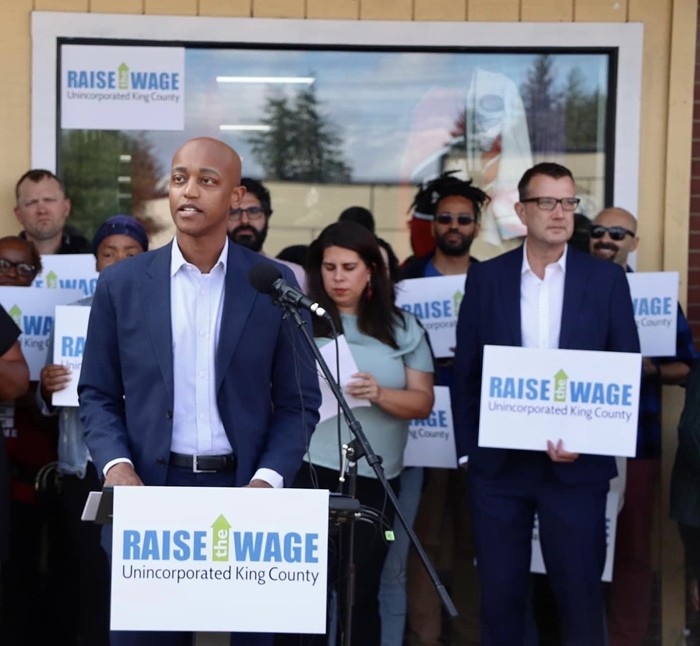Washington’s Supreme Court has been lauded as the most progressive in the nation, but the Court’s recent decision upholding Washington’s capital gains tax fell far short of that moniker.
By upholding the tax on narrow, technical grounds in Quinn v. State, the Court’s majority deeply disappointed anyone hoping the justices would pave the way for wholesale reform of Washington’s unrepentantly regressive tax code. Instead, the Court—split between cautious centrists and conservative dissenters—charted a safe course, revealing that none of our state’s highest judges are willing to champion Washington’s working class.
The Court’s cautious path was predictable—and widely predicted—but that doesn’t excuse the justices’ failure to endorse a more democratic, equitable tax system. Of course, the state desperately needs the estimated $500 million from the tax to fund early childhood programs. But the Court could have gone further and acknowledged the State Legislature’s existing authority to directly tax the incomes of Washington’s mega-rich to pay for thousands of affordable homes, a health care system capable of treating everyone, and everything else a truly progressive state would guarantee its residents.
Failing to take that step reveals that our state Supreme Court suffers from the same ideological imbalance that’s broken the nation’s highest Court: conservatives are willing to stake out their maximalist positions in fiery (if illogical) dissents, but no one on the Court seems willing to take the same approach from the left.
It’s not as if the progressive argument is all that hard to articulate, or even particularly controversial. Washington’s legal academics have agreed, for decades, that our Court’s income tax prohibition has no legal or logical basis. All Washington needs is a new generation of judges willing to acknowledge that the government exists to provide for the basic needs of its constituents, not protect the profits of the rich.
Conservative Justices Play the Long Game
The only two dissenters in Quinn v. State didn’t stand a chance of persuading their centrist colleagues on the Court to invalidate the capital gains tax. After all, as University of Washington Law professor Hugh Spitzer explained 30 years ago, their arguments are bunk. Professor Spitzer is no radical—he endorsed conservative Republican Ann Davison for Seattle City Attorney—but his careful legal analysis failed to convince the Court’s two old-school dissenters.
The dissenters parroted outdated arguments from the business interests trying to overturn the tax. They said that income is property, citing a long line of cases tracing back to the Court’s famously sloppy 1933 decision in Culliton v. Chase. Using the flawed reasoning of that line of cases, the dissenters argued that the capital gains tax was actually a tax on income, which means a tax on property. Since Washington’s Constitution caps property taxes at one percent, they concluded that the seven percent capital gains tax was an illegal property tax instead of a legal excise tax.
As Professor Spitzer explains in his weirdly engaging law review article, this entire split between “excise” and “property” taxes is fundamentally a disagreement about who can regulate and redistribute wealth. The narrow 5-4 majority in Culliton labeled Washington’s wildly popular Great Depression-era income tax a “property” tax because they believed income taxes were Trojan horses that would destroy the very idea of private property.
Like the Founding Fathers before them, the judges who wrote Culliton seemed to fear that democratically elected legislatures would use their power to override property rights and redistribute wealth to the undeserving majority. To these conservatives, who embodied the anti-worker Lochner era beloved by today’s ultra-conservative US Supreme Court, nothing was more horrifying than voters attempting to claw back the ill-gotten gains of the obscenely wealthy.
Courts, then, had to save the rich from the people’s duly elected representatives.
Unfortunately, the Washington justices who dissented in Quinn uncritically parroted this same conservative dogma, declaring that income is property, property is sacred, and courts must aggressively protect property from an overreaching legislature. Washingtonians struggling to afford rent and meet their basic needs deserved better, particularly coming from judges who have often written more thoughtful opinions.
Washingtonians Deserve a Truly Progressive Supreme Court
Even more disappointing, though, is that the Court had no strong progressive voice making the case for a more just, democratic economy. Rather than challenging the dissenters’ conservative orthodoxy, the court’s centrist majority avoided the fundamental argument and left in place a legal framework that ultimately harms every Washingtonian.
Americans are surrounded by the legal gimmicks that the rich use to shield their ill-gotten wealth, from trusts to limited liability entities to crooked loans. Our courts already overwhelmingly favor the wealthy. The Quinn decision, which will only make our unjust tax code marginally fairer, is not enough.
As previous generations of Washington judges understood, our elected representatives need to be able to enact sweeping, redistributive tax reform without fearing years of frivolous litigation secretly funded by wealthy reactionaries. And while some may argue that elected officials in the legislative or executive branch are the proper leaders of such a movement, our justices are elected as well.
Washington voters deserve justices who understand that our state Constitution has never protected oligarchy. The Court cannot—and should not—make laws, but the Court must use its power to protect and nurture democracy.
Despite having that power, not a single judge wrote a separate, concurring opinion outlining a legal framework consistent with Washington’s Constitution: one that promotes democracy and rejects the tyranny of a wealthy, reactionary minority.
Our justices could easily have gone further. Reforming Washington’s tax code does not require radical legal change. As Professor Spitzer explained 30 years ago, Washington’s Constitution gives the State Legislature all the power it needs to tax the rich. Our Court needs justices who aren’t afraid to agree with him.
Austin Field is a public defender in Seattle. Before attending law school at the University of Washington, he was an Army infantry officer, a law firm operations manager, and a public defense investigator. The views expressed are his own.



















